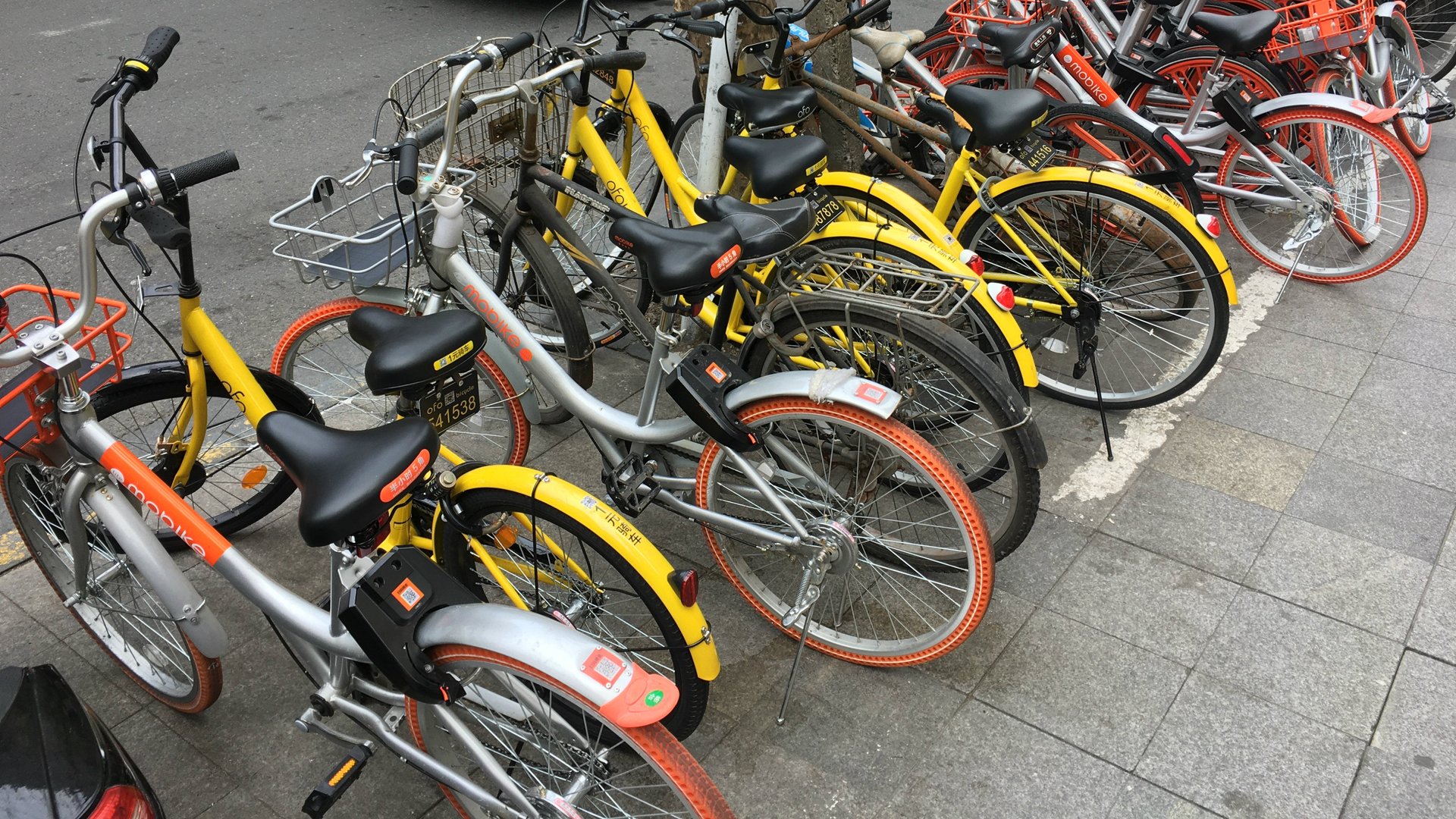One of China’s top bike-sharing startups is now paying users to ride its bikes
Over the past year in China, a sudden surge of “Uber for bike” startups made commuting easier than ever by scattering thousands of bikes across cities for people to find anywhere, ride anywhere, and park anywhere, all for a small fee of about 0.5 yuan ($0.14) for 30 minutes (conveniently paid for via a smartphone app).


Over the past year in China, a sudden surge of “Uber for bike” startups made commuting easier than ever by scattering thousands of bikes across cities for people to find anywhere, ride anywhere, and park anywhere, all for a small fee of about 0.5 yuan ($0.14) for 30 minutes (conveniently paid for via a smartphone app).
Yet these bike-sharing startups face a dilemma. Since riders can ride the bikes wherever they please, many are left parked in desolate locations—quiet neighborhoods, freeways, or even ditches. Once left there, they’re unlikely to be found by another rider, and therefore unlikely to earn the company money.
Now Mobike, one of China’s top-funded bike-sharing companies, formally known as Beijing Mobike Technology, has introduced a feature that provides credit or cash rewards for users that find and ride bikes left in remote areas, in hopes they’ll then be parked somewhere better.
Typically, when a user opens Mobike’s app, they’ll see a map of all the bikes parked in the vicinity. As of last week, Mobike has begun designating some vehicles ”bonus bikes,” labeled with a red envelope. According to Mobike, users who hop on these bikes and ride them for at least ten minutes will be eligible to receive a cash gift worth between 1 yuan and 100 yuan (between $0.15 and $14.55). That minimum gift is already higher than the price of a 30-minute ride on Mobike’s “discount” tier Mobike Lite.

A Mobike representative tells Quartz that the program aims to encourage users to move bikes from low-traffic areas to high-traffic spots. According to the feature’s English-language explanation, riding a bike to a high-traffic area like a subway stop or business district will help increase the size of the cash gift. Longer rides will also be compensated with larger cash gifts.
Uber, the spiritual predecessor of Mobike and its ilk, famously spent hundreds of millions of dollars on bonuses encouraging drivers to drive, and discounts encouraging passengers to hail rides. But it never went so far as to give customers cash for taking a trip.
How can Mobike afford to pay users to ride its bikes? The company has received over $300 million in venture capital funding recently, including from a recent funding round led by Chinese tech giant Tencent and private equity firm Warburg Pincus, which gives it plenty of money to burn on “growth.” This entails getting as many bikes on the streets as possible, and as many people to ride the bikes, while postponing profitability indefinitely. As the one of the top-funded bike-sharing startups, the company has more flexibility to spend on these efforts than its competitors (which number in the dozens).
Underused bikes (as well as damaged or vandalized vehicles) pose a significant cost burden on Mobike and its ilk. Since the bike-sharing companies own their bike fleets (unlike Uber, which owns almost none of its car fleets), they are responsible for recouping the cost of purchasing and maintaining each one. A bike that gets ridden eight times a day (a generous estimate, given the ubiquity of bike-sharing competitors in Chinese cities) for 30 minutes each at full price, will generate 4 yuan in revenue—about fifty cents. In that optimistic scenario, it would take a bike more than six months to earn Mobike $100.
Typically, Mobike and other its competitors have been employing two methods for retrieving bikes from low-traffic areas—”bonus credit” schemes that offer discounts or free rides to users that report abandoned bikes, as well as paid staff hired to go around the city collecting and redistributing abandoned bikes.
The cash gifting scheme, however, will only heighten the costs of retrieving bikes—and threatens to even more quickly drain the venture capital money that makes the scheme possible in the first place.